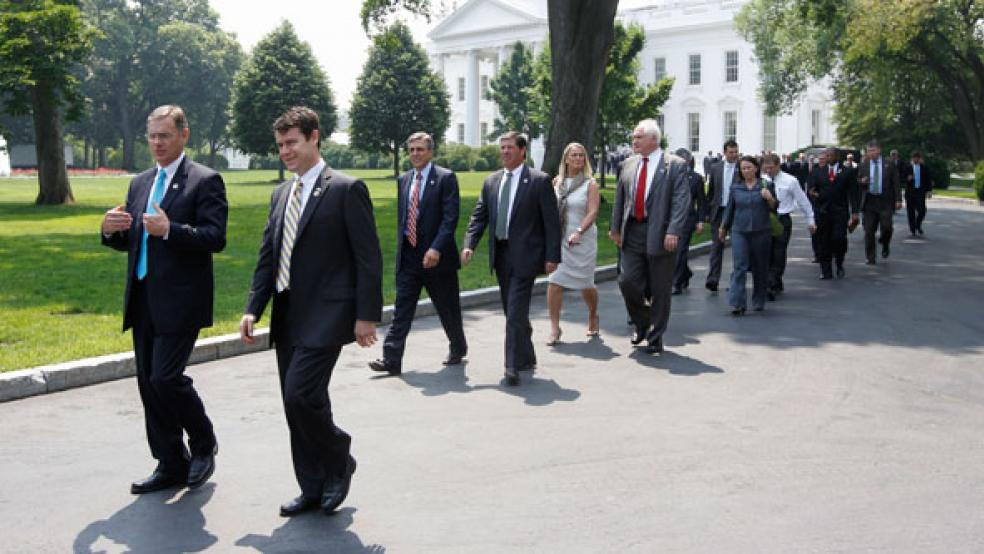A day after rejecting an increase in the nation’s borrowing limit, House Republicans continued to press President Obama for trillions in spending cuts in exchange for an increase in the government’s spending authority.
House Speaker John Boehner, R-Ohio, described discussions with the president as “frank” and “productive.” But GOP leaders didn’t indicate whether the one hour meeting in the East room of the White House addressed the debt limit or produced concrete progress on reaching an agreement on spending cuts. “I’m looking forward to more serious conversations about how we reduce the deficit and the debt and get our economy going again to create jobs,” Boehner said.
The Treasury has said Congress needs to raise the $14.3 trillion debt ceiling before August 2 or risk default for the first time in U.S. history. “If we are going to raise the debt limit, the spending cuts should exceed the increase in the debt limit otherwise it will serve to cost jobs in our country,” House Speaker John Boehner, R-Ohio., told reporters outside the White House. “It’s not what the American people want.”
All 241 House GOP members met with the President to share ideas about how to jump-start the economy. They said they discussed jobs, tax reform, Medicare and the Environmental Protection Agency but didn’t get a detailed plan on spending cuts. “Unfortunately what we did not hear from the President was a specific plan of his to deal with the debt crisis that could actually be scored by the Congressional Budget Office,” said Rep. Jeb Hensarling, R-Texas. He said Republicans “fear that the debt burden is going to lead to high taxes,” which would further destroy employment.
Rep. Paul Ryan, R-Wisc., House Budget Committee Chair and author of the GOPs’ controversial Medicare plan, said the president has described his proposal incorrectly as a voucher program. "I just said we've got to take on this debt and if we demagogue each other at the leadership level then we're never going to take on our debt," Ryan told reporters after the meeting. But Ryan insisted the meeting was not confrontational.
Obama “doesn't believe that we need to end Medicare as we know it," White House press secretary Jay Carney said at a White House briefing, about an hour after the meeting.
The House Republican budget proposal includes a provision to turn Medicare into a voucher program, which has sparked contentious debate among lawmakers and 2012 GOP presidential hopefuls. Recent polls suggest overhauling Medicare is highly unpopular with Americans. Political analysts have said the Republican proposal was largely responsible for last week’s Democratic upset in a l House special election in a conservative upstate New York district.
House Majority Leader Eric Cantor, R-Va., said he told the President of +his concerns with the current situation in the economy, referring to Wednesday’s report from payroll-servicing firm ADP estimating that just 38,000 new jobs were created in the private sector in May.. Republicans insist they can bring the deficit down through added jobs, and get people back to work.
"The President admitted that we have to look at growing this economy, and the discussion focused on the philosophical difference on whether Washington should continue to pump money into the economy, or whether we should provide an incentive for entrepreneurs and small businesses to grow,” Cantor told reporters. “I think the President was well aware and admitted the fact that private sector job creation is not enough, and he did mention that a lot of the losses were in the public sector.”
As Rep. Phil Gingrey, R-Ga., walked out of the White House he told reporters the meeting was “frosty” and “cool”. Tim Murphy, R-Pa., described the meeting as a “good group therapy”. “Any conversation that keeps going is a good thing,” Murphy said. Michele Bachmann, R-Minn., said she and other members took extensive notes on the meeting but were not advised there would be a follow up.
In advance of today’s meeting, Boehner released a statement signed by more than 150 economists, supporting his call for spending cuts to exceed the increase in the debt ceiling.
“Increasing the debt ceiling without significant spending cuts and budget reforms will send a message to American job creators that we still are not serious about ending Washington’s spending addiction, and this will bring further harm to private-sector job growth in America,” Boehner said in a statement.
Democrats disagree. Jared Bernstein, Vice President Biden’s former chief economist, told American Public Media, “You don't enact the kinds of measures like aggressive spending cuts in the very near term that could offset a recovery that's still pretty nascent, that's still really trying to reach escape velocity.” Biden is leading bipartisan negotiations to reach agreement on more than $1 trillion in spending cuts in the short term, with an eye to a total of $4 trillion in deficit reduction in the coming decade or so.
The House Tuesday overwhelming rejected an increase the nation’s borrowing authority by $2.4 trillion without major spending cuts to federal spending. The largely symbolic vote was intended to demonstrate that nothing will be done to raise the debt ceiling until Republicans complete negotiations with President Obama and Senate Democratic leaders on a major deficit-reduction package.
Related Links:
Obama Meets GOP Lawmakers at White House; No Progress on Debt Reduction (The Washington Post)
Ryan Confronts Obama on Medicare (POLITICO)
Jared Bernstein on the Debt Ceiling and Economic recovery (American Public Media)





